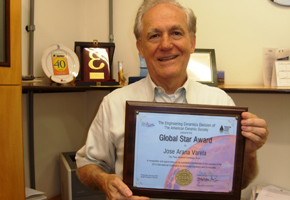CEO of FAPESP’s Executive Board receives international ceramics award
Unesp Professor José Arana Varela is honored with the American Ceramic Society’s 2013 Global Star Award.
CEO of FAPESP’s Executive Board receives international ceramics award
Unesp Professor José Arana Varela is honored with the American Ceramic Society’s 2013 Global Star Award.

Unesp Professor José Arana Varela is honored with the American Ceramic Society’s 2013 Global Star Award
By José Tadeu Arantes
Agência FAPESP – Professor José Arana Varela, CEO of FAPESP’s Executive Board and full professor at Universidade Estadual Paulista’s Chemistry Institute (IQ-UNESP) at the Araraquara Campus, has just added another award to the vast collection accumulated over his career.
The newest honor is the 2013 Global Star Award, which he received from the hand of American Ceramic Society President, Richard Brow, in a session of the 37th International Conference and Exposition on Advanced Ceramics and Composites held on January 28, 2013, in Daytona Beach, Florida.
According to the American Ceramic Society, the event’s sponsor and the world’s most important institution in this field, the award recognizes “relevant contributions” in the field of ceramics research.
The conference brought together more than 1,200 researchers from several countries that work on advanced ceramics research. Varela was one of the co-chairs of the Summit of the Americas, one of the event’s symposia.
“I am happy about the award because I see it as recognition of the research work being conducted in Brazil in the area of ceramics,” explained Varela in an interview with Agência FAPESP.
In the past, Varela has played a major role in Brazil’s two sector associations: the Brazilian Ceramics Association, which brings together researchers and industry representatives, of which he was the director, and the Brazilian Society for Materials Research, which is more academic in nature, of which he was president in 2010 and 2011.
New research
One of the more recent projects that Varela coordinated was a nanostructured semiconductor gas sensor. The sensor was formed by copper oxide nanowires, which because of their nanodimensions have a large area of contact with the medium. The device has a strong ability to adsorb molecules.
The exchange of electrons with the adsorbed molecules produces variations in the electrical resistance of the material, which makes the material a very sensitive detector of the presence of gases such as hydrogen.
The article is the result of joint work between a Unesp team lead by Varela and comprising Diogo Volanti, Anderson Felix, Marcelo Orlandi, and Elson Longo, and a team from Massachusetts Institute of Technology (MIT) led by Harry Tuller and comprising George Whitfield and Dae-Jin Yang. The study was
funded by FAPESP and MIT through an agreement between the institutions.
Materials Research Society
Varela holds a degree in Physics from Universidade de São Paulo (USP), a Master’s in Physics from the Aeronautics Technological Institute (ITA), and a doctorate in Materials Science from the University of Washington.
In addition to serving as a full professor at Unesp’s Chemistry Institute and as CEO of FAPESP’s Executive Board, he participates actively in several institutions, including the Superior Innovation and Competitiveness Council of the São Paulo State Federation of Industry (Fiesp), the Brazilian Society of Physics, the World Academy of Ceramics, the American Ceramics Society, and the Materials Research Society. Among his many awards is the Scopus Elsevier Prize, given for his contribution to science in Brazil.
With an already very busy agenda, Varela has been invited to chair the
2014 MRS Fall Meeting & Exhibit from November 30 to December 5, 2014. The meeting of the Material Research Society will be held in Boston, Massachusetts, bringing together 6,500 participants.








